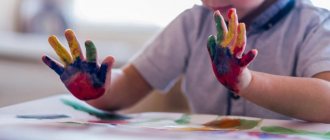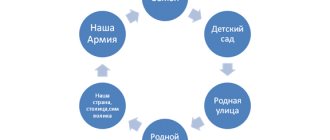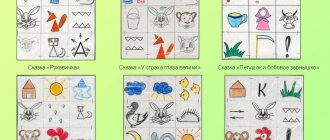MAGAZINE Preschooler.RF
COGNITIVE - RESEARCH ACTIVITIES IN DECREATIONAL IU IN THE CONDITIONS OF IMPLEMENTATION OF THE FSESBabynina T.N., Burmitskaya N.N., Moroz E.A. MDOU "Combined kindergarten No. 19, Razumnoye village, Belgorod district"
“The best discovery is the one that a child makes himself . Ralph W. Emerson.
The cognitive research activities of children in kindergarten are invaluable for the development of the personality of a preschooler. This type of activity is important and one of the leading ones. It is through exploration that children learn about the world around them and acquire new knowledge. Cognitive research activities are necessary in every age period of a preschooler. In different age groups, according to the principle of using age-appropriate types of children's activities, this can be observation, experimentation, targeted walks, excursions, and various problem situations.
Preschool children are by nature inquisitive explorers of the world around them. “It’s better to test it once, try it, do it yourself ,” practice teachers say.
The work of a teacher, based on the Federal State Educational Standard (FSES), should be aimed at developing cognitive activity and research skills in children. In accordance with the requirements of the Federal State Educational Standard, kindergarten teachers need to organize situations that provoke the cognitive activity of pupils. One of the forms of such influence is experimental research activities in preschool educational institutions.
In the process of mastering methods of practical interaction with the environment, children transform objects in order to reveal their hidden significant connections with natural phenomena. Knowledge of the surrounding world as a whole is impossible without knowledge of nature. Studying problems to become familiar with natural phenomena is a means of mental, aesthetic education.
Cognitive research activity is not only to facilitate children’s assimilation of specific information about plants, animals, natural phenomena, to instill in them environmental skills and respect for the natural world and the environment, but also allows the child to develop qualitatively. Younger preschoolers, with the help of an adult, and older ones independently go in search of knowledge, are interested in everything new, unknown, ask adults a lot of questions, make guesses, reason, think, look for different ways to solve problem situations, experiment, rejoice and be surprised by their own discoveries.
Psychologists emphasize that for a child’s development, it is not the excess of knowledge that is crucial, but the method of acquiring it, determined by the type of activity in which this knowledge is acquired. Conducting experiments and organizing experimentation is one of the effective ways to educate preschoolers’ ecological culture. Research provides the child with the opportunity to find answers to the questions “how?” and why?" .
One of the general tasks of the kindergarten is to work on developing ideas about cause-and-effect relationships through experimental activities in nature, taking into account the regional component, using innovative programs and methods, as well as modern forms of education.
Research activities are of great interest to children. The practical actions performed by the child develop the cognitive, tentatively research function, creating conditions for revealing the content of a given object, and therefore knowledge about cause-and-effect relationships is formed. This type of activity has a positive effect on the emotional sphere of the child; to develop creative potential, to improve health by increasing the level of physical activity. In the process of cognitive research activities, children have the opportunity to realize their characteristic curiosity, to imagine themselves as a scientist, researcher, discoverer. At the same time, the teacher is not a mentor, but becomes a playing partner in joint activities, and this allows the child to show his own research activity.
In the process of children's experimentation, kids learn: to find and identify a problem, to accept and set a goal, to solve problems, to analyze an object or phenomenon, to identify essential features and connections, to compare various facts, to put forward hypotheses, proposals, to choose the means and materials necessary to carry out this activity, carry out an experiment and draw conclusions. Children experience great delight and surprise from their small and large “discoveries ,” which make them feel proud of the work they have done. In the course of such work, preschoolers are better and faster able to find a way out of difficult situations and cope more easily with the problems that arise.
In the process of research activities, the child gains experience:
- Physical: learns to control your body and certain organs.
- Natural history: gets acquainted with the real world around us, with the properties of objects and cause-and-effect relationships operating in the world.
- Social: remember the individual characteristics of each person.
- Cognitive: train thought processes, master a variety of mental operations.
- Linguistic: engage in word creation, discuss the results of the experiment, play word games, that is, experiment with words.
- Strong-willed: remember how he himself can influence people.
- Personal: recognize your personal capabilities.
- Behavioral: model your behavior in various situations.
Children's cognitive activity should be ensured through the use of methods of observation of natural objects and natural phenomena, game modeling and experimentation, problem-game situations, work in nature, and viewing illustrations. It is important that the methods used correspond to the interests of children, their cognitive abilities, and the characteristics of their attitude towards the environment.
The organization of a developmental environment is one of the conditions for solving the problems of research activities in kindergarten. “An experiment or experience is a special type of observation organized in specially created conditions” A.I. Vasilyev, and therefore each kindergarten group is equipped with “mini-laboratories” for experimentation, where children can independently and with the help of an adult reproduce simple and more complex experiments. The laboratory was created to develop children's interest in research activities, where the development of primary natural science concepts, observation, and curiosity occurs.
The laboratory is constantly updated with new materials for experimentation, which are in a place accessible to children.
Depending on the age of the children, the Experimentation Center may contain:
- Various instruments: scales, magnifying glasses, magnets, microscopes, magnifying glasses;
- A variety of vessels made from various materials
- Natural materials: leaves, sand, clay, earth, seeds;
- Nuts, paper clips, screws, nails, wire;
- Medical materials: pipettes, flasks, syringes, measuring spoons, cotton wool, bandage;
- Waste material: plastic, pieces of fabric, leather, fur;
- Flour, salt, soda, candles, lanterns;
- Children's robes, aprons;
- Schemes-algorithms for conducting experiments;
- Journal for recording results, etc.
In the process of cognitive research activities, the teacher encourages children to independently accept and set cognitive tasks, put forward proposals about the causes and results of observed natural phenomena, notice contradictions in judgments, and use different ways to verify proposals; trial and error method, experiments, comparative observations. Teachers take into account children’s preferences for learning about various natural objects, are interested in who or what they would like to learn about, and are attentive to children’s questions. They support preschoolers' interest in nature, observation, experimentation, and studying materials from encyclopedias and magazines. They stimulate the manifestation of children's curiosity, the desire to study natural phenomena more deeply, using the basic methods of cognition.
Thus:
- Experimental activities help make communication with children more trusting and friendly; it encourages them to engage in independent research and active learning.
- Children's experimentation, as a method in pedagogical work, is highly effective and indispensable for the development of preschoolers' research activities, cognitive activity, and increasing the amount of knowledge, skills and abilities.
List of used literature:
- Dybina O. V. “Classes on familiarization with the outside world in the second junior group of kindergarten” M.: Mozaika - Synthesis, 2007 (methodological manual).
- Nikolaeva S. N. “Methods of environmental education in kindergarten . – M. 1999.
- Odintsova L. Experimental activities in preschool educational institutions. Toolkit. – M.: Sfera, 2012.
| Next > |
Cognitive and research activities of older preschoolers
Lidia Shatunova
Cognitive and research activities of older preschoolers
Cognitive and research activities of older preschoolers
A Chinese proverb says:
“Tell me and I’ll forget, show me and I’ll remember, let me try and I’ll understand.”
The formation of research skills is one of the most important tasks within the framework of the Federal State Educational Standard. In modern requirements of the Federal State Educational Standard, much attention is paid to the development of experimental activities in preschoolers . The advantage is that it gives children real ideas about the various aspects of the object or phenomenon being studied.
The world of physical phenomena surrounding the child provides enormous opportunities for the systematic development of transformation abilities as a component of general mental abilities
Creativity is important in the mental development of children. Creativity is based on the creative abilities of preschool children , which are a system of special actions to transform the initial situation using special means.
Preschool age is unique , it is important not to miss this period to unleash the creative potential of each child. During the period of preschool childhood, the ability for initial forms of generalization and inference is formed. In the course of experimental-cognitive activity, situations are created that the child resolves through experimentation, analysis, and comparison.
In children of older preschool age, visual-effective and visual-figurative thinking is formed. The child is an explorer. Children want to learn as much as possible about the world around us. From early childhood, the child strives to use all his senses to get to know this world. And what he himself tries or touches or sees will allow him to gain new knowledge about the unknown. The desire to learn something new helps a child develop more fully and quickly. As older , they often ask questions about physical phenomena, the origin of planets, stars, etc.
The teacher must create a situation where the child himself wants to find out how to get the necessary information, conduct basic experiments, observations in order to confirm or refute his assumptions.
Experimental activities in preschool age help children master relationships and develop logical thinking. The child learns to analyze, compare, find similarities and differences. He is given the opportunity to independently find a solution and choose a method to solve the problem.
To do this, the teacher can use various techniques:
- heuristic conversations
- raising and solving problematic issues
- observations
-modeling
-experiences
- recording the results of observations, experiments, work activities .
- immersion in the sounds and colors of nature
-imitation of bird sounds
- use of thin words
- didactic games
- work assignments
An experiment or observations independently conducted by a child allows him to create a model of a phenomenon, obtain results, classify them, and draw conclusions. The child needs to get an answer to his questions, not only how and why, but also why, and what result I want to see.
Experimental activities can be carried out either individually or with a subgroup of children.
Children are presented with a problem and asked to find ways to solve it. By conducting research and observations, children see the result and discuss the results, draw conclusions and conclusions.
Experiments allow you to state a fact, compare or generalize the results obtained.
Experimental activities can be carried out throughout the day:
During nodes, walks, work activities , gaming activities .
By conducting experiments, children see the results of the work done. They, in turn, are of great importance for the child’s self-esteem and for increasing his cognitive interest . Experiments have a positive effect on the emotional sphere of the child, on his abilities, and give children real ideas about the various aspects of the object being studied, its relationship with other objects and with the environment.
The main result of the work is the acquisition of the skill of independent, creative, research work.
Literature:
Federal State Educational Standard-2014
Kulikovskaya I. E. Sovgir N. N. Children's experimentation
Older age . - M; Pedagogical Society of Russia, 2003 79 p.
Prokhorova L.N. Organization of experimental activities of preschoolers : Methodological recommendations.
N. V. Nishcheva Comprehensive program of preschool education for children with special needs
N. E. Veraksa, O. R. Galimov Cognitive and research activities of preschool children
N. N. Poddyakov “Creativity and self-development of preschool . Conceptual aspect. — Change, 1995.


